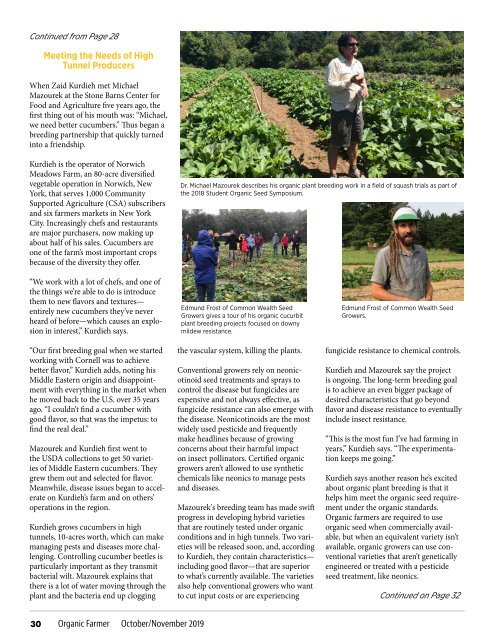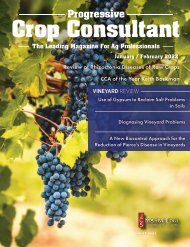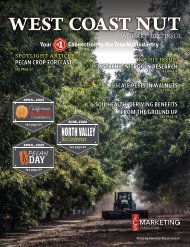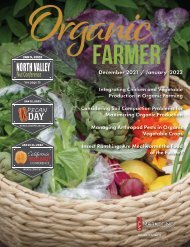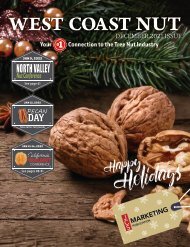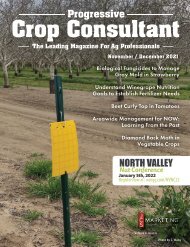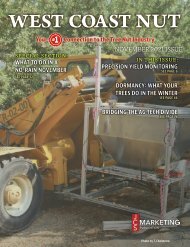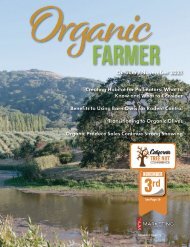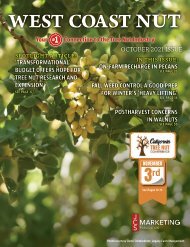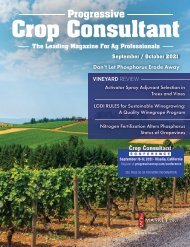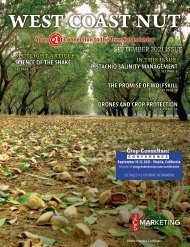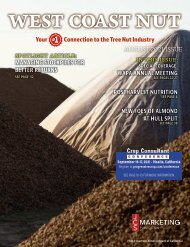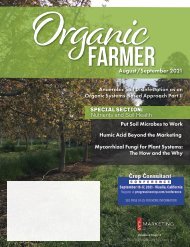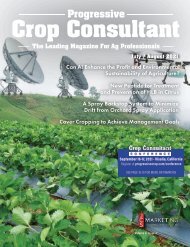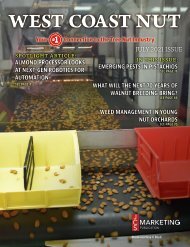Organic Farmer October/November 2019
You also want an ePaper? Increase the reach of your titles
YUMPU automatically turns print PDFs into web optimized ePapers that Google loves.
Continued from Page 28<br />
Meeting the Needs of High<br />
Tunnel Producers<br />
When Zaid Kurdieh met Michael<br />
Mazourek at the Stone Barns Center for<br />
Food and Agriculture five years ago, the<br />
first thing out of his mouth was: “Michael,<br />
we need better cucumbers.” Thus began a<br />
breeding partnership that quickly turned<br />
into a friendship.<br />
Kurdieh is the operator of Norwich<br />
Meadows Farm, an 80-acre diversified<br />
vegetable operation in Norwich, New<br />
York, that serves 1,000 Community<br />
Supported Agriculture (CSA) subscribers<br />
and six farmers markets in New York<br />
City. Increasingly chefs and restaurants<br />
are major purchasers, now making up<br />
about half of his sales. Cucumbers are<br />
one of the farm’s most important crops<br />
because of the diversity they offer.<br />
Dr. Michael Mazourek describes his organic plant breeding work in a field of squash trials as part of<br />
the 2018 Student <strong>Organic</strong> Seed Symposium.<br />
“We work with a lot of chefs, and one of<br />
the things we’re able to do is introduce<br />
them to new flavors and textures—<br />
entirely new cucumbers they’ve never<br />
heard of before—which causes an explosion<br />
in interest,” Kurdieh says.<br />
“Our first breeding goal when we started<br />
working with Cornell was to achieve<br />
better flavor,” Kurdieh adds, noting his<br />
Middle Eastern origin and disappointment<br />
with everything in the market when<br />
he moved back to the U.S. over 35 years<br />
ago. “I couldn’t find a cucumber with<br />
good flavor, so that was the impetus: to<br />
find the real deal.”<br />
Mazourek and Kurdieh first went to<br />
the USDA collections to get 50 varieties<br />
of Middle Eastern cucumbers. They<br />
grew them out and selected for flavor.<br />
Meanwhile, disease issues began to accelerate<br />
on Kurdieh’s farm and on others’<br />
operations in the region.<br />
Kurdieh grows cucumbers in high<br />
tunnels, 10-acres worth, which can make<br />
managing pests and diseases more challenging.<br />
Controlling cucumber beetles is<br />
particularly important as they transmit<br />
bacterial wilt. Mazourek explains that<br />
there is a lot of water moving through the<br />
plant and the bacteria end up clogging<br />
Edmund Frost of Common Wealth Seed<br />
Growers gives a tour of his organic cucurbit<br />
plant breeding projects focused on downy<br />
mildew resistance.<br />
the vascular system, killing the plants.<br />
Conventional growers rely on neonicotinoid<br />
seed treatments and sprays to<br />
control the disease but fungicides are<br />
expensive and not always effective, as<br />
fungicide resistance can also emerge with<br />
the disease. Neonicotinoids are the most<br />
widely used pesticide and frequently<br />
make headlines because of growing<br />
concerns about their harmful impact<br />
on insect pollinators. Certified organic<br />
growers aren’t allowed to use synthetic<br />
chemicals like neonics to manage pests<br />
and diseases.<br />
Mazourek's breeding team has made swift<br />
progress in developing hybrid varieties<br />
that are routinely tested under organic<br />
conditions and in high tunnels. Two varieties<br />
will be released soon, and, according<br />
to Kurdieh, they contain characteristics—<br />
including good flavor—that are superior<br />
to what’s currently available. The varieties<br />
also help conventional growers who want<br />
to cut input costs or are experiencing<br />
Edmund Frost of Common Wealth Seed<br />
Growers.<br />
fungicide resistance to chemical controls.<br />
Kurdieh and Mazourek say the project<br />
is ongoing. The long-term breeding goal<br />
is to achieve an even bigger package of<br />
desired characteristics that go beyond<br />
flavor and disease resistance to eventually<br />
include insect resistance.<br />
“This is the most fun I’ve had farming in<br />
years,” Kurdieh says. “The experimentation<br />
keeps me going.”<br />
Kurdieh says another reason he’s excited<br />
about organic plant breeding is that it<br />
helps him meet the organic seed requirement<br />
under the organic standards.<br />
<strong>Organic</strong> farmers are required to use<br />
organic seed when commercially available,<br />
but when an equivalent variety isn’t<br />
available, organic growers can use conventional<br />
varieties that aren’t genetically<br />
engineered or treated with a pesticide<br />
seed treatment, like neonics.<br />
Continued on Page 32<br />
30<br />
<strong>Organic</strong> <strong>Farmer</strong> <strong>October</strong>/<strong>November</strong> <strong>2019</strong>


